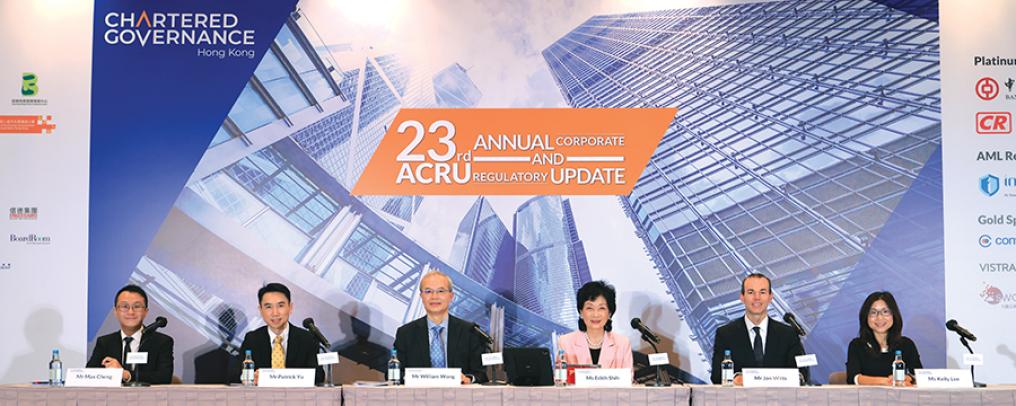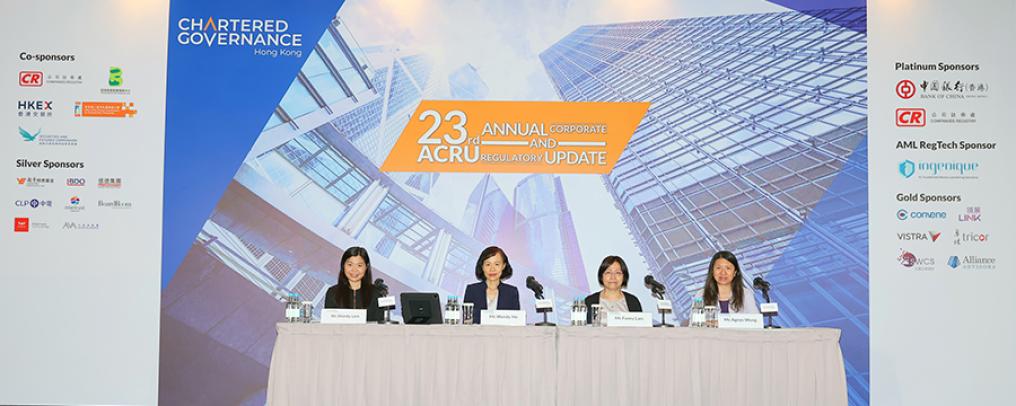
Trends in listed company regulation – ACRU 2022 review: part two
This second part of CGj’s review of the Institute’s 23rd Annual Corporate and Regulatory Update (ACRU) highlights key takeaways from the second session of the webinar, featuring speakers from the Securities and Futures Commission (SFC).
The first part of this review makes the point that listed company enforcement activity continues to rise in Hong Kong. This is as true for the SFC as it is for Hong Kong Exchanges and Clearing Ltd (HKEX). Kenneth Luk, Senior Director, Enforcement Division, SFC, reported that new investigations into IPO-related misconduct doubled over the last financial year and there has been a similar surge in cases involving the money lending practices of listed companies.
Speaking in the second session of the webinar – chaired by David Simmonds FCG HKFCG, Institute Vice-President and Chairman of the Membership Committee – Mr Luk said that these two types of misconduct accounted for half the new investigations the SFC started in the last financial year and that the SFC has set up two specialised teams to handle these areas of malpractice.
He also pointed out that, for investors, the first line of defence is not regulatory intervention but good corporate governance among listed companies themselves. ‘Cases that are passed to our enforcement team often involve companies with poor corporate governance, or companies whose corporate governance and internal controls exist only on paper,’ he said.
He added that where governance and internal controls fail, the external auditors play a very important role in uncovering problems. Cases often come to the attention of the SFC enforcement team where auditors have raised concerns and issued a qualified opinion on the accounts. ‘We rely heavily on the auditors to do a good job of uncovering problems and to put pressure on the directors to make proper disclosure in the financial statements,’ he said.
IPO-related misconduct
As outlined above, IPO-related misconduct has been a major focus of the SFC’s enforcement work in the last financial year and Clarence Chan, Director, Corporate Finance Division, SFC, addressed this issue in his ACRU presentation. He started by pointing out that the SFC’s front-loaded approach to regulation focuses on early intervention. ‘We strive to mitigate misconduct risks at an early stage with a view to preventing possible misconduct, as opposed to detection after the fact,’ he said.
He added that this aligns the SFC’s work with that of company secretaries and governance professionals. ‘Company secretaries and governance professionals need to demonstrate professional scepticism and take appropriate follow-up action in response to hints of potential problems before harm is done,’ he said.
Red flags
Looking out for red flags that might be an early indicator of malpractice is a key component of the SFC’s front-loaded approach. In the context of IPOs, these red flags include unusually high IPO underwriting commissions and discretionary bonuses paid to underwriters. The commissions in question exceeded 20% of the total IPO proceeds in some cases.
In addition, regulators in Hong Kong have seen cases where companies paid very substantial fees shortly after listing for various kinds of professional services, such as public relations, market research, corporate finance and accounting services. In some cases these fees were paid upfront for services to be provided over a period of several years.
‘There is reason to suspect that, in some cases, a portion of the underwriting commissions and other fees were used to partially finance share subscriptions by some controlled investors,’ Mr Chan said.
This suspicion is strengthened in cases where the IPO applicant has a high shareholding concentration. There is a risk that some investors are controlled by related parties to mask the lack of genuine investor interest in the shares. ‘This calls into doubt the existence of an open, orderly and fair market in the shares, which is of central importance to the integrity of our stock market,’ said Mr Chan.
He added that such red flags may result in the rejection of the listing application but, even where an applicant has been rejected, that doesn’t necessarily mean that the SFC’s regulatory process has ended. ‘We would continue to see whether there are sufficient grounds for further action and investigation of the intermediaries and other parties involved in the IPO. Governance professionals involved in an IPO are encouraged to look out for these red flags and to take appropriate follow-up action to make our market a healthy one,’ he said.
Another speaker from the SFC gave an overview of the SFC’s new Code of Conduct requirements on book-building and placing activities. Anthony Wong, Director, Intermediaries Supervision, Intermediaries Division, SFC, gave ACRU participants an introduction to the new Code, which will become effective in August 2022 following a consultation in 2021. The new Code defines the roles of capital market intermediaries and overall coordinators in book-building and placing activities and sets out the conduct requirements expected of these roles. He recommended that ACRU participants take a look at the new Code and the subsequent FAQs issued by the SFC in May 2022.
Enforcement strategies
In IPO misconduct cases, the focus of the SFC enforcement team is on whether fraud in contravention of Section 300 of the Securities and Futures Ordinance (SFO) is involved. Mr Luk said that this may include the use of nominees pretending to be independent investors in a bid to mislead regulators and investors into believing that there is investor demand for the IPO shares at the IPO price. These parties may be financed in part by funds diverted from the unusually high underwriting commissions or other IPO expenses mentioned above.
The SFC also focuses on whether there has been any false or misleading disclosures, such as misrepresentations about the use of IPO proceeds or the omission of material expenses. This may constitute a contravention of sections 384 and 298 of the SFO, or may constitute market misconduct in contravention of section 277 of the SFO, which can be dealt with by the Market Misconduct Tribunal (MMT).
The SFC also looks into whether the directors have discharged their fiduciary duties. If directors have not exercised due care skill and diligence, or have failed to act in the best interests of the company, the SFC may take civil action against them.
Questionable loans
Another major focus of the SFC’s enforcement work over the last 12 months has been the rise in questionable loan cases, usually involving listed companies granting substantial unsecured loans to purported third parties. Many of these loans were granted without a reasonable commercial rationale, credit assessment or even proper documentation, and eventually resulted in substantial impairment losses.
In some cases, the loans were granted shortly after the company had raised funds from the investing public by issuing new shares or corporate bonds. The proceeds from these fundraising exercises were very quickly transferred out of the company by way of substantial unsecured loans to individuals, or companies with scant past business relationships with the company. Shortly after the loans had been granted, the responsible directors resigned, leaving the bad debt behind.
The SFO provisions discussed above in the context of IPO-related misconduct, as well as the legal remedies available to the SFC, are also applicable in these questionable loan cases. Mr Luk added, however, that in both IPO misconduct and questionable loan cases, the SFC collaborates closely with other law enforcement agencies. If any part of the proceeds of the fundraising activities, for example, find their way back to the management of the listed company, this begs the question of whether management has obtained advantages from counterparties in breach of the Prevention of Bribery Ordinance. This would come under the remit of the Independent Commission Against Corruption.
Similarly, if any of the counterparties to the transactions are nominees of management, the transactions are effectively a means of syphoning money away from the company, and the SFC may make referrals to the police and collaborate closely with them in investigating the case.
Insider dealing
Another important message to emerge from ACRU 2022 is the increasing sophistication of the technological tools used by enforcement teams to detect malpractice. For example, the SFC is digitising and automating the process of obtaining and analysing bank records. Local banks can now submit bank statements to the SFC via its proprietary online submission platform. Artificial intelligence (AI) is then used to derive useful data from the statements. The SFC is also developing a tool that will automatically identify suspicious fund flow patterns, which will enable it to trace funds more effectively and efficiently.
These developments have particular significance for the SFC’s enforcement work to combat insider dealing. Mr Luk cited two recent insider dealing cases that originated from the SFC’s electronic surveillance of securities trading.
In the first case, the company secretary of China Automation Group Ltd was convicted of insider dealing. The defendant became aware of a possible general offer for the company shares. Before he arranged for a trading suspension, he purchased 534,000 shares through his wife’s account and she then sold his shares at a profit. Although the defendant only made a profit of around HK$7,000, and had a good background without a previous criminal record, he was sentenced to immediate imprisonment and ordered to pay a fine and the SFC’s costs.
In the second case, a former executive director and a former company secretary of Asia Telemedia Ltd withheld price-sensitive information from the market relating to the company’s indebtedness. Both sold their shareholdings in the company before the information was disclosed to the public and avoided a loss of approximately HK$3 million and HK$1 million, respectively.
Mr Luk pointed out that the MMT report on this case discusses at length the important role and responsibility of company secretaries. ‘The MMT considers a company secretary as a member of senior management with a duty to advise the board on all matters of good governance. This includes advising the board on matters that should be reported to the market, such as matters that may constitute price-sensitive information,’ he said.
He emphasised that company secretaries need to be aware of their responsibilities in this area. ‘Ensure your organisations have robust governance to manage the flow of insider information and ensure its timely disclosure to the public in accordance with the SFO requirements and best business practices,’ Mr Luk said.
More information is available on the SFC website: www.sfc.hk.
SIDEBAR: Takeovers, mergers and share buy-backs
Another area of close scrutiny by the SFC over the last 12 months has been compliance with Hong Kong’s due diligence requirements for takeovers, mergers and share buy-backs. Roger Cheng, Senior Director, Corporate Finance Division, SFC, focused his ACRU presentation on the lessons to be learned from some recent breaches of the Codes on Takeovers and Mergers and Share Buy-backs (collectively the Codes).
The basic underlying principle of the Codes is that all shareholders should be treated equally. Equal access to information is a key part of this and Mr Cheng highlighted its relevance to the work of governance professionals involved in acquisition deals. In particular, governance professionals have a role in keeping transactions confidential until they’re ready to be announced.
He pointed out that leaks relating to merger and acquisition transactions can have severe consequences. For example, leaks relating to the price of the transaction will set a price floor for the offer. Moreover, leaks will result in an obligation upon the parties to the transaction to put out an announcement and the offer period will commence upon this announcement. The offeree will also be subject to the relevant regulatory requirements under the Codes, including all of the required disclosures and restrictions on the ability of directors to resign.
‘It’s not simply a matter of inconvenience,’ Mr Cheng said. ‘There are a lot of adverse potential consequences for you and your company, so it’s very important for all matters to be kept confidential until they’re ready to be announced.’


